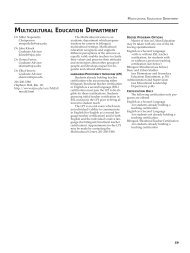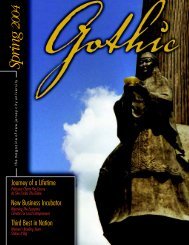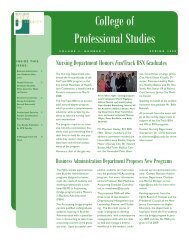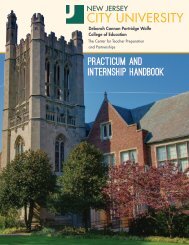Graduate Catalog - New Jersey City University
Graduate Catalog - New Jersey City University
Graduate Catalog - New Jersey City University
Create successful ePaper yourself
Turn your PDF publications into a flip-book with our unique Google optimized e-Paper software.
38 GRADUATE CATALOG 2013-2016 NEW JERSEY CITY UNIVERSITY<br />
ART DEPARTMENT<br />
Prof. Martin Kruck, MFA Chairperson<br />
mkruck@njcu.edu<br />
201-200-3241<br />
<strong>Graduate</strong> Coordinator<br />
<strong>Graduate</strong>art@njcu.edu<br />
201-200-3214<br />
Visual Arts Building<br />
http://www.njcu.edu/dept/art/programs/<br />
Master of Fine Arts<br />
The Master of Fine Arts program is an<br />
intensive 60-credit interdisciplinary studio<br />
art program that results in the terminal<br />
degree. Studio practice and the study of<br />
critical theory are employed to foster intellectual<br />
growth and individual achievement.<br />
The primary emphasis is the development<br />
of a personalized, professional, art-making<br />
practice that may be carried through to a<br />
lifetime career. By focusing on art production<br />
along with historical and critical studies,<br />
the MFA program stresses artistic skill,<br />
critical thinking and awareness of cultural<br />
and social frameworks as intrinsic parts<br />
of the curriculum. Students may work in<br />
any single or combination of studio areas<br />
including: Painting/ Drawing, Graphic<br />
Design, Printmaking, Photography, Computer<br />
Arts, Sculpture, Illustration, Clay, or<br />
Jewelry/Metalsmithing. MFA students work<br />
closely with faculty mentors and culminate<br />
their studio thesis in a solo exhibition.<br />
PREREQUISITES FOR ADMISSION<br />
Transcripts of previous college study, a<br />
professional resume, two letters of recommendation,<br />
a two-page statement of<br />
purpose relative to interest in a direction of<br />
study, and a portfolio of artwork demonstrating<br />
abilities in studio art and/or design.<br />
The portfolio must contain 20 images of<br />
finished work and sent to the <strong>Graduate</strong> Art<br />
Coordinator as jpegs on CD/DVD, a PDF<br />
portfolio, or URL link to a website. For<br />
each specific studio program, a graduate<br />
faculty committee assesses and evaluates all<br />
submitted materials for evidence of individual<br />
capability and demonstrated capacity<br />
for creative and professional work.<br />
The Art Department may require undergraduate<br />
courses it deems necessary to<br />
satisfy the prior requirements for participation<br />
in the MFA program. Forty-five credits<br />
of the MFA program must be completed at<br />
NJCU.<br />
Transfer applicants must fulfill the application<br />
requirements requested of those<br />
wishing to enter the MFA program for the<br />
first time.<br />
ADVISEMENT<br />
The <strong>Graduate</strong> Coordinator performs<br />
preliminary advisement in charting initial<br />
curriculum choices tailored to the needs and<br />
backgrounds of each admitted applicant.<br />
Once enrolled in the MFA program, the<br />
student works with faculty advisors who<br />
guide the student through the program,<br />
mentor the student’s independent studio<br />
work, and provide career guiadance and<br />
counseling to achieve comprehensive development<br />
of the student’s professional potential.<br />
It is possible for students to request a<br />
change of advisors during their programs,<br />
but it is recommended they remain with<br />
the same faculty for the last two semesters<br />
while they are working on their exhibition<br />
and thesis.<br />
REVIEW/EVALUATION<br />
To assure proper guidance of the student’s<br />
progress, periodic reviews take place in the<br />
MFA program. At the completion of twelve<br />
credits of specified course work, an Art<br />
Department faculty committee reviews the<br />
development of the MFA thesis-exhibition<br />
and critiques the student’s progress. Successful<br />
evaluations permit the student’s<br />
continuation in the program. Interim<br />
progress evaluations occur at the end of<br />
each semester.<br />
PROGRAM REQUIREMENTS<br />
Code Title Credits<br />
Studio Art 18<br />
Master Critique 12<br />
Art electives 9<br />
Art History/<br />
Theory courses 9<br />
ART 660 Master Thesis Seminar I 3<br />
ART 661 Master Thesis Seminar II 3<br />
<strong>Graduate</strong> electives or<br />
Cooperative<br />
Education course 6<br />
Final, successful completion of specified<br />
course work in a given studio program<br />
requires a 3.00 GPA and the presentation<br />
of a master’s thesis project (exhibition) and<br />
verbal defensefor assessment by a faculty<br />
committee which determines degree<br />
completion.<br />
The master’s thesis project is expected to<br />
be of comparable quality to professional<br />
work in the field by demonstrating studio<br />
talent, conceptually and technically strong<br />
approaches, and informed research.<br />
The thesis exhibition must give evidence<br />
of the student’s ability to produce a professionally<br />
significant visual body of work and<br />
to present his/her aesthetic ideas competently<br />
in written and verbal form.<br />
Master of Arts in Studio Art<br />
The Master of Arts in Studio Art is a<br />
39-credit degree program designed to provide<br />
continued professional development in<br />
a selected specialized area of the visual arts:<br />
Fine Arts, Design and Crafts, or Communication<br />
Design.<br />
Augmented by studies in art history,<br />
aesthetics, other art electives or art education,<br />
the program may also serves as a<br />
foundation for advanced work at the MFA<br />
or doctoral levels. Of the 39 credits required<br />
for the degree, 18 must be taken in an area<br />
of studio specialization, with an additional<br />
9 credits in other studio areas. Six credits in<br />
art history, aesthetics, and theoretical studies<br />
enhance the studio program. Three credits<br />
in graduate courses, education courses, or<br />
cooperative education placements broaden<br />
the focused studio program.<br />
Under faculty supervision, a culminating<br />
master’s research project is developed, which<br />
is assessed by a faculty committee.<br />
PREREQUISITES FOR ADMISSION<br />
Transcripts of previous college study, a<br />
professional resume, two letters of recommendation,<br />
a two-page statement of<br />
purpose relative to interest in a direction<br />
of study, and a portfolio of studio work of<br />
15-20 jpeg images on CD/DVD, PDF, or<br />
website link must be sent to the <strong>Graduate</strong><br />
Art Coordinator.<br />
Students admitted without matriculation<br />
in a conditional status may complete up to<br />
twelve credits in art (nine credits in studio).<br />
Students wishing to then apply for matriculation<br />
must have earned a 3.00 GPA in the<br />
twelve credits taken. Studio work completed<br />
during the conditional/non-matriculation<br />
period will be reviewed by the <strong>Graduate</strong><br />
Committee before continuation in the<br />
program is permitted.


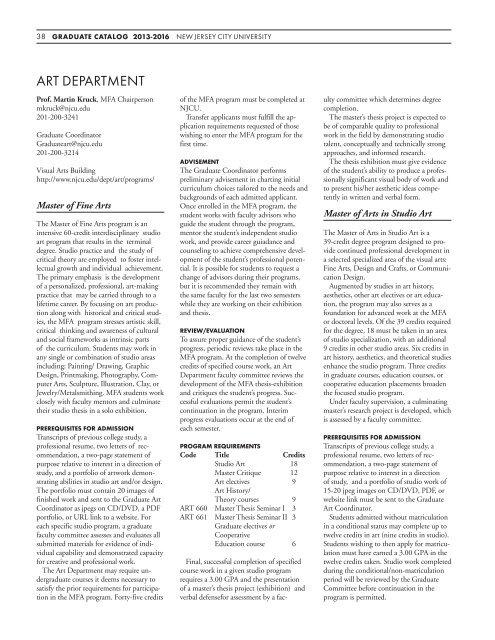
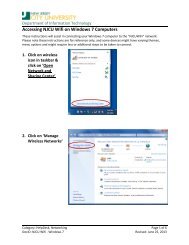
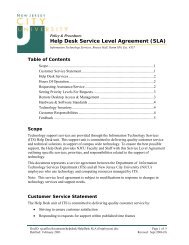

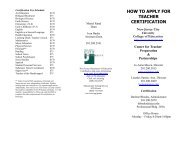
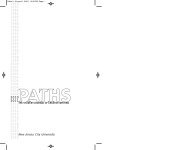

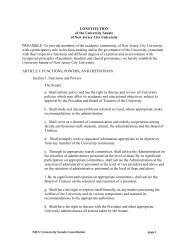
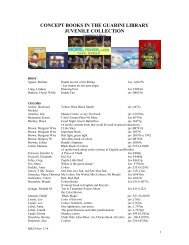
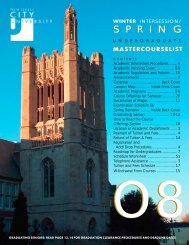
![UACHS 9th English Unit- Feed[1] - New Jersey City University](https://img.yumpu.com/46563190/1/190x245/uachs-9th-english-unit-feed1-new-jersey-city-university.jpg?quality=85)
